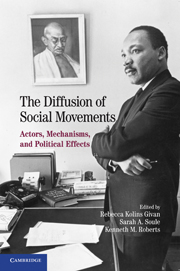Book contents
- Frontmatter
- Contents
- List of Tables
- List of Figures
- Contributors
- Preface and Acknowledgments
- 1 Introduction: The Dimensions of Diffusion
- PART I DIFFUSION AND THE FRAMING OF CONTENTIOUS POLITICS
- 2 Transnational Networks and Institutions: How Diffusion Shaped the Politicization of Sexual Harassment in Europe
- 3 Temporality and Frame Diffusion: The Case of the Creationist/Intelligent Design and Evolutionist Movements from 1925 to 2005
- 4 Framing Labor's New Human Rights Movement
- 5 Framing the GMO: Epistemic Brokers, Authoritative Knowledge, and Diffusion of Opposition to Biotechnology
- PART II MECHANISMS OF DIFFUSION
- PART III DIFFUSION, SCALE SHIFT, AND ORGANIZATIONAL CHANGE
- General Bibliography
- Index
3 - Temporality and Frame Diffusion: The Case of the Creationist/Intelligent Design and Evolutionist Movements from 1925 to 2005
Published online by Cambridge University Press: 05 June 2012
- Frontmatter
- Contents
- List of Tables
- List of Figures
- Contributors
- Preface and Acknowledgments
- 1 Introduction: The Dimensions of Diffusion
- PART I DIFFUSION AND THE FRAMING OF CONTENTIOUS POLITICS
- 2 Transnational Networks and Institutions: How Diffusion Shaped the Politicization of Sexual Harassment in Europe
- 3 Temporality and Frame Diffusion: The Case of the Creationist/Intelligent Design and Evolutionist Movements from 1925 to 2005
- 4 Framing Labor's New Human Rights Movement
- 5 Framing the GMO: Epistemic Brokers, Authoritative Knowledge, and Diffusion of Opposition to Biotechnology
- PART II MECHANISMS OF DIFFUSION
- PART III DIFFUSION, SCALE SHIFT, AND ORGANIZATIONAL CHANGE
- General Bibliography
- Index
Summary
In this chapter, we seek to expand our understanding of how frames travel over time and especially of some of the factors that affect the temporal diffusion of frames. We do so by examining the extent to which the various frames associated with the creationist/intelligent design movement and the evolutionist movement have evolved and mutated from the famous Scopes Monkey Trial in 1925 to the intelligent design (ID) trial in Dover, Pennsylvania in 2005, and by exploring some of the factors contributing to this process of frame change and evolution. We explore these changes within the context of the legal institution, focusing on legal framing in the major court cases involving the teaching of evolution and creation science in public schools in America since the famed Scopes trial. We are not the first to explore legal framing, as Pedriana (2006), among others, has examined competing legal frames within the women's movement. We extend this research by focusing on framing between oppositional movements mobilized around the issues of creationism and evolution.
We begin to answer our questions by providing an overview of the relevant diffusion and framing literature and the issues not sufficiently examined by this literature. We then consider the ongoing debate over teaching evolution and creationism in the schools as it has played out over the years in the American judicial system. Next, we discuss our data sources and procedures. We then elaborate our findings and consider their implications for understanding the interplay of framing and diffusion over time.
Information
- Type
- Chapter
- Information
- The Diffusion of Social MovementsActors, Mechanisms, and Political Effects, pp. 34 - 55Publisher: Cambridge University PressPrint publication year: 2010
Accessibility standard: Unknown
Why this information is here
This section outlines the accessibility features of this content - including support for screen readers, full keyboard navigation and high-contrast display options. This may not be relevant for you.Accessibility Information
- 9
- Cited by
